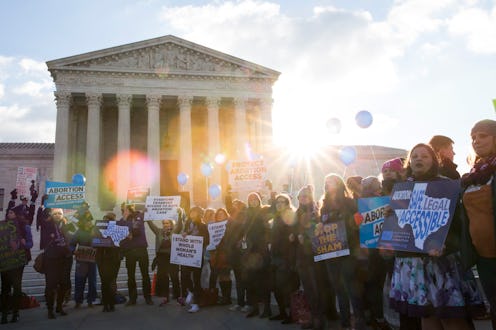News
What You Can Expect From The SCOTUS Abortion Case
The Supreme Court will hear arguments in the case of Whole Woman's Health v. Herllerstedt starting Wednesday to decide the fate of HB-2, a Texas law that has severely limited abortion access, causing over a dozen clinics throughout the state to close. Millions of pro-choice and pro-life proponents across the country are following the case closely, since its outcome could be detrimental in the long term to either cause. If you're anxiously awaiting the verdict, here's what you can expect from the SCOTUS abortion case.
The case has come a long way to make it to the Supreme Court, but now that it's finally there, the first step is the oral arguments. Representatives for each side as well as amici curae (friends of the court) will present the facts of the case and argue the various merits of both perspectives. For the Whole Woman's Health advocates, the argument rests on the SCOTUS's verdict in 1992's Planned Parenthood v. Casey , which ruled that abortion regulations are legal as long as they don't place an undue burden on an abortion-seeker. Meanwhile, the Hellerstedt side hopes to demonstrate that HB-2 only has the best interests of women's health in mind, and therefore does not represent an undue burden. Arguments rarely take very long, and should be done by the end of Wednesday. The official SCOTUS calendar only allocated that day for the court to hear arguments, which means that each side gets half an hour to present oral arguments.
Next, the justices meet to discuss the case and vote on the outcome. Unlike oral arguments, these proceedings aren't open to the public, so what goes on behind the closed doors of the court is something of a mystery. One of four things can happen during these arguments — the judgment can be reversed, affirmed, vacated, or remanded. In a reversal, the court issues a disagreement with the lower court's ruling. In this case, that would mean that the lower court's decision to uphold the abortion restrictions would be overturned and the restrictions would have to end. In an affirmative judgement, the opposite is true, and HB-2 would be upheld. If the judgment were vacated, it would mean that the previous decision in the case was somehow invalid and could be completely wiped from the record. This is pretty rare, though, and extremely unlikely to happen here. Finally, were it remanded, the judgment would be sent down to be argued in the lower court again.
Once the justices meet to make their decisions, all that's left is the announcement of the verdict and the ceremonial running of the interns. It took nearly two months for the court to release its ruling on the historic marriage equality case last summer. It doesn't always take that long, but this is also an extremely contentious issue, so there could be a significant waiting period before the verdict is announced. However the verdict could also be released very early, which would be most likely to happen in the event of a split decision. With four progressive justices and four conservative justices currently sitting on the bench, and seemingly no hope for a tiebreaker any time soon, the justices may just pass the case along and let it come back to them when the bench is filled out. The justices are scheduled to have a conference about the cases of the week this Friday, so a verdict may be forthcoming as early as next week.
The case represents scary possibilities for both sides. If pro-choicers win, abortion restrictions may be a lot harder to pass through legislation, while if pro-lifers win, it may be impossible to access abortion care in many parts of the country. This seems like a pivotal moment for America, so be sure to watch out for that verdict, which may come very soon.
